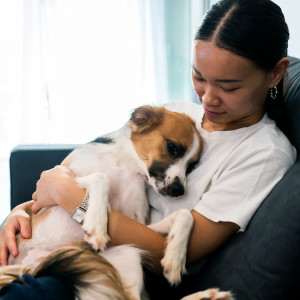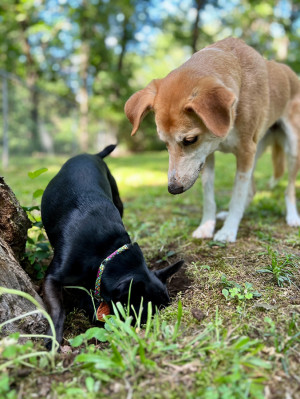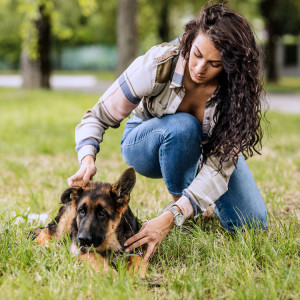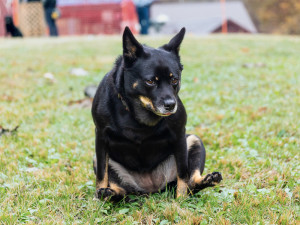What Can I Give My Dog for Diarrhea?
It’s not fun for anyone.

Share Article
In This Article:
Dog Diarrhea Treatment When Does A Dog Need Medication for Diarrhea? When Does a Dog Need Medication for Diarrhea? What Can I Give My Dog for Diarrhea? Monitoring and Potential Side Effects
Here’s a stinky reality of being a dog parent: Did you know that your dog’s poop can provide valuable insights into their overall health? Abnormal stools can happen quite often. In fact, diarrhea is one of the most common visit types for veterinary visits across the country.
So, with a problem so common, you might be wondering when your pup needs to visit a veterinarian, or if it is safe to address the issue at home. This article can help guide dog parents in deciding how to treat diarrhea at home, with what, and when it’s time to pay your vet a visit.
The importance of addressing diarrhea in dogs:
Diarrhea is one of the most common reasons dogs visit the veterinarian. Aside from this being disruptive to your and your dog’s daily routine (think urgent middle of the night walks!), consecutive days of untreated diarrhea can lead to discomfort from abdominal cramping, dehydration, inflammation in the gastrointestinal tract leading to blood in the stool, vomiting, and loss of appetite.
So, while one or two episodes of soft stools may not require any action on your part, if your pup is experiencing diarrhea for more than a couple of days, it’s probably worth intervening.

Dog diarrhea treatment
One of the most common complaints I hear in emergency hospitals and urgent care clinics is, “My dog has diarrhea.” This is often accompanied by additional descriptors such as, “My dog’s had diarrhea for two days, and now I think he’s starting to feel bad, too,” or, “It just keeps coming out of her like a faucet. For the love of everything holy, please fix it.”
Every dog parent will have to deal with their dog getting a case of juicy poos eventually. Usually, a dog’s diarrhea is short-lived and resolves on its own or with basic dog diarrhea treatment. Sometimes the cause is clear — the consequence of an abrupt diet change or a parent who gave into puppy eyes and shared their french fries. Other times, it can be the first clue to an underlying health issue like infection or organ disease.
Common causes of diarrhea in dogs include:
Diet change
Dietary indiscretion
Stress
Intestinal parasites
Pancreatitis
Liver or kidney disease
Food allergies or intolerances
Diarrhea treatment for dogs sometimes depends on the cause, but many pet parents see success with a bland diet for dogs with diarrhea. Other common easy treatments include fiber, probiotics, or simply upping a dog’s water intake by giving wet food.
Common medications used to address diarrhea
When thinking of medications to use for diarrhea, it’s important to consider the causes of diarrhea in dogs. The most common causes of diarrhea in dogs is dietary indiscretion (eating something they shouldn’t have, new food or treats, getting into the garbage, etc.) or stress. These are usually self-limiting and do not require treatment with medication. Often, we are unable to identify the underlying cause, and treatment is mainly supportive, such as counteracting dehydration with fluids and treating secondary pain or nausea.
Probiotics are a mainstay of treatment of diarrhea, as this helps to balance the gut microbiome and promote more healthy GI bacteria. Many times, probiotics along with a home-cooked, bland diet is all you need to treat short and minor bouts of diarrhea. Examples of a bland diet may include boiled chicken breast (no skin, bones, or dark meat!) and some white rice.
If your dog is sensitive to chicken, you can consider lean ground turkey or beef. Pumpkin or plain potato is a high-fiber and starchy option that can help bind your pup’s stools and help them firm up. Remember, this diet is not balanced and should not be fed for more than a couple of days. But when this alone doesn’t cut it, some over-the counter options may help.
Over-the-counter-medications for dogs diarrhea
In general, you should consult your veterinarian on any medications you will be giving your pet to ensure the safety and the dosage. For diarrhea that is consistent with no believed bacterial origin, some vets may recommend the use of an oral anti-diarrheal medication called loperamide (commercially known as Immodium) for three to five days. This drug should be used with caution in Collie and Australian Shepherd breeds; they have a known sensitivity to this type of drug.
Dose depends on your dog’s weight, so contacting your veterinarian would be helpful here. Bismuth subsalicylate (commercially known as Pepto Bismol) is also occasionally used in dogs. This can be toxic to cats and should be avoided. In general, the above medications should be used under veterinary supervision and should not be used in young or geriatric dogs, or in dogs with known heart, kidney or liver disease.
When does a dog need medication for diarrhea?
Not every case of dog diarrhea needs a medication prescription. For pet parents taking a “wait and see” approach to their dog’s diarrhea, it’s important to recognize when medical intervention may be needed. There is a lot of water loss associated with diarrhea and continuous diarrhea can make a dog dehydrated.
Veterinary treatment for a dog with diarrhea can include fluid therapy (under the skin or intravenous) and medications. If you think your dog needs veterinary attention for their diarrhea, don’t hesitate to contact your vet. Don’t continue to wait it out or start to reach for over the counter treatment for diarrhea in dogs if your dog is unwell.
If your dog is exhibiting any of the following signs, treatment may be required for your dog’s diarrhea:
Diarrhea lasting for more than two days
Loss of appetite
Vomiting
Loss of energy
What can I give my dog for diarrhea?
If your dog’s diarrhea is persistent and you start to think “what can I give my dog for diarrhea”, don’t just reach for anything in your medicine cabinet. Never give human medications to your dog without consulting with your veterinarian first. Some products may do more harm than good.
That being said, medications, whether prescription or over-the-counter treatment for diarrhea in dogs, can play a role in managing the condition. Not every case of diarrhea calls for medication, but these are some commonly recommended treatments.
Probiotic supplements
Probiotics are microorganisms that are beneficial to and promote balance in the gut — in other words, the “good” bacteria. Probiotics have been shown to speed up the time it takes for dogs with diarrhea to start producing normal stool again. Veterinarians often prescribe canine-specific probiotic supplements to help speed up the healing and recovery process for a dog with diarrhea.
Antibiotics
Antibiotics are commonly prescribed for certain cases of dog diarrhea, though it is falling out of favor due to lack of evidence that it actually helps the healing process, as well as concern about antibiotic resistance. When a dog’s diarrhea is accompanied by a fever, certain blood work abnormalities, or failure to respond to treatment, antibiotics may be necessary.
Anti-diarrhea medications
Some medications are prescribed to directly target the gut. Some anti-diarrhea medications, like loperamide, work by increasing fluid absorption and decreased fluid secretion in the intestines. They may also decrease intestinal spasms, which helps ease a dog’s constant and sudden urge to poop. Though it can be effective for humans, loperamide isn’t safe for all dogs.
Other medications, like kaolin-pectin products, work by reducing inflammation and absorbing substances in the gut. The goal is to absorb some of the bacterial toxins contributing to the diarrhea. Anti-diarrhea medications can also absorb other medications that a dog is on, so always talk to your vet before giving anything that’s over the counter.
Dewormers
One of the most common tests I recommend when I see dogs with diarrhea is a fecal exam to look for intestinal parasites. While many monthly preventatives protect dogs from common bugs, they don’t address them all. If a dog’s gut is teeming with parasites, the diarrhea won’t get better without treating the root cause with deworming. Common intestinal parasites that cause diarrhea in dogs include:
Hookworms
Roundworms
Coccidia
Tapeworms
Whipworms
Administration and dosage
Any medications that are prescribed by your veterinarian should be given at the same time each day, with dose and frequency followed exactly as they recommend. Many medications need to be given with food, and dogs with diarrhea should not be given too many treats or snacks which may further worsen clinical signs.
Stick with bland foods, such as bread, rice, or small pieces of chicken breast, in which you can hide medication. It is recommended to avoid higher-fat items, like cheese, nut butter, or darker cuts of meat.
Home remedies for diarrhea in dogs
Dog parents can provide at-home care for their dog’s diarrhea, either before seeking veterinary care (if the diarrhea is mild) or after getting treatment and guidance from their vet. Common home remedies for dog diarrhea include:
Bland diet
Many dogs with diarrhea can benefit from eating a bland, easily digestible diet while their intestinal tract recovers. Prescription diets are available from your veterinarian. You can also prepare a bland diet at home by boiling low-fat chicken breast, ground beef, or ground turkey. Don’t add any salt or seasoning. The protein can be accompanied by plain white rice. Just remember that a home-prepared diet does not meet a dog’s complete nutritional needs and should only be fed temporarily.
Pumpkin
A common question pet parents ask when looking for home remedies is, “Is pumpkin good for dogs with diarrhea?” Canned pumpkin can be beneficial for dogs with uncomplicated diarrhea. Canned pumpkin is a good source of fiber, helping to balance the amount of water in the intestinal tract and firm up stool. It also acts as a prebiotic, providing nutrition to the good bacteria in the gut.
If you give your dog canned pumpkin, be sure to give plain pumpkin puree and not pumpkin pie filler, which is full of sugar and other additives. There’s no set dose for how much canned pumpkin a dog should get, but a general guideline is one to three teaspoons per day for small to medium dogs and 3 to 5 tablespoons per day for large dogs weighing over 50 pounds.
Rest
Fasting a dog by withholding food and sometimes water to aid in diarrhea treatment used to be a common recommendation.
In the past, fasting a dog by withholding food — and sometimes water — was commonly recommended for dogs with diarrhea. However, studies have shown that feeding as soon as possible helps intestinal cells heal and recover more quickly. While your dog’s gut doesn’t need an extended break, your dog may appreciate some down time. Let your dog take it easy while they recover. Stress can contribute to diarrhea, and the added stress of constant activity can slow the healing process.
Monitoring and potential side effects
With any medication, it is possible that a dog may not tolerate it well or possibly have a reaction to it. Monitoring your dog closely when starting any new medications for signs of vomiting, loss of appetite, or decreased energy is always a good idea.
FAQs
What human meds can dogs take for diarrhea?
In general, it is best to give any medication to your dog under the supervision of a veterinarian. Many medications used to treat diarrhea in people are also used in dogs, but doses and frequency can vary greatly. Some medications should be avoided in dogs with other underlying conditions.
What does it mean if your dog is pooping liquid?
Liquid stool in dogs could be a sign of gastrointestinal upset. This commonly occurs when a dog eats something they shouldn’t have, or secondary to stress. Or this symptom could be due to another illness.
What medications can cause diarrhea in dogs?
Many commonly used medications can cause diarrhea in dogs. Frequently, oral heartworm or flea and tick preventive medications can cause diarrhea or vomiting in dogs. Giving this medication with a meal may help avoid this side effect.

Dr. Gabrielle Fadl, DVM
After graduating from Kansas State University College of Veterinary Medicine, Dr. Fadl returned to the New York area to pursue a one-year rotating internship and has been working in general practice since. Dr. Fadl loves working in the pet space to foster the powerful human-animal bond. She hopes to continually learn and grow to practice the best quality medicine. Her motto is “Keep calm and try to take it as it comes.”

Dr. Alycia Washington, DVM, MS
Alycia Washington is a small-animal emergency veterinarian with over 10 years of experience based in North Carolina. She works as a relief veterinarianopens in new tab and provides services to numerous emergency and specialty hospitals. She also works as a veterinary writer with a focus on educating pet parents.
Related articles
![A black dog with a tilted head looks attentively at the camera while sitting in grass.]()
Is My Dog’s Poop Normal?
From bloody poop to diarrhea—all your dog’s poop problems explained.
![Cavalier King Charles spaniel puppy running in a garden]()
Parvovirus: How to Identify and Treat Parvo Symptoms in Puppies
The potentially deadly virus can be prevented with one simple step.
![Adorable dog sitting on a rug next to some boots scooting]()
Scooting After Pooping: Weird Things Dogs Do, Explained
Dog trainer Emma Bowdrey helps explain this common canine behavior.
![Two dogs digging outside in the dirt.]()
Types of Worms in Dogs: How to Detect and Treat Worms in Dogs
Here are the types of worms your pup could get, how you know they have them in the first place, and how to get rid of them for good.
![Young woman comforting German Shepherd puppy outside.]()
My Dog Is Pooping Blood: What Should I Do?
It’s an alarming sight, but here’s what you should know.
![Pug dog scooting on a wooden floor in the kitchenFunny dog enjoying scratching his bum on grass at public dog park.]()
Home Remedies For Dog Scooting
A vet on what to do when “anal sacs go bad.”









